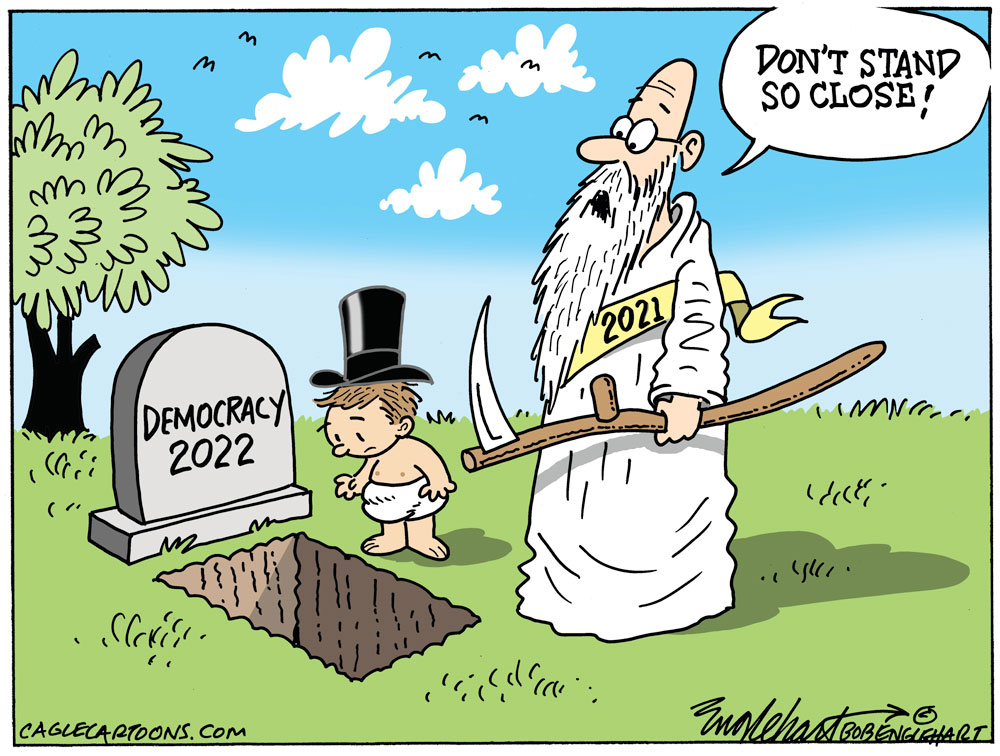
Today at the Editor’s glance: In court: Circuit Court Judge Terence Perkins’s busy docket continues with a few pleas today and docket sounding–the scheduling of trials–in more than a dozen cases, plus sentencing hearings in drug cases. On Sunday the world lost one of its greatest minds in biologist E.O. Wilson. “As an expert on insects, Dr. Wilson studied the evolution of behavior, exploring how natural selection and other forces could produce something as extraordinarily complex as an ant colony. He then championed this kind of research as a way of making sense of all behavior — including our own,” the Times obituary reads. “As part of his campaign, Dr. Wilson wrote a string of books that influenced his fellow scientists while also gaining a broad public audience. “On Human Nature” won the Pulitzer Prize for general nonfiction in 1979; “The Ants,” which Dr. Wilson wrote with his longtime colleague Bert Hölldobler, won him his second Pulitzer, in 1991.” Curiously, while Wilson died Sunday, today marks the 48th anniversary of the Endangered Species Act, which Nixon signed into law while on vacation in California.
Now this:
![]()
The Live Calendar is a compendium of local and regional political, civic and cultural events. You can input your own calendar events directly onto the site as you wish them to appear (pending approval of course). To include your event in the Live Calendar, please fill out this form.
January 2026
ESL Bible Studies for Intermediate and Advanced Students
Grace Community Food Pantry on Education Way
Palm Coast Farmers’ Market at European Village
Al-Anon Family Groups
‘Lady Day at Emerson’s Bar and Grill,’ the Billie Holiday Story, at City Rep Theatre
East Flagler Mosquito Control District Board Meeting
Nar-Anon Family Group
For the full calendar, go here.

“It has become fashionable to speak of th Enlightenment as an idiosyncratic construction by European males in a bygone era, one way of thinking among many different constructions generated across time by a legion of other minds in other cultures, each of which deserves careful and respectful attention. To which the only decent response is yes, of course — to a point. Creative thought is forever precious, and all knowledge has value. But what counts most in the long haul of history is seminality, not sentiment. If we ask whose ideas were the seed of the dominant ethic and shared hopes of contemporary humanity, whose resulted in the most material advancement in history, whose were the first of their kind and today enjoy the most emulation, then in that sense the Enlightenment, despite the erosion of its original vision and despite the shakiness of some of its premises, has been the principal inspiration not just of Western high culture but, increasingly, of the entire world.”
–E.O. Wilson’s “Consilience” (1998).
The Cartoon and Live Briefing Archive.




































Ray W. says
Ryszard Kapuscinski, a Polish journalist and prolific author, was born in 1932 in eastern Poland. He saw the Soviet army drive out the Polish army from his region in 1939. He saw the German army drive the Soviet army back through his region in 1941. He saw the Soviet army return through his region in 1944. He came of age and graduated from college in communist Poland and was hired out of university by the Polish government to work as a journalist. Initially sent to the Indian subcontinent as an international journalist early after the founding of democratic governments in India and Pakistan, he then travelled to Africa to report on the withdrawal of colonial governments throughout that continent. Later, he reported from South America. He covered the overthrow of 27 governments and wrote about the effects occasioned by the collapse of the Soviet government. I suspect that Kapuscinski knew more, firsthand, about revolution and the precariousness of democracy than any current radio talk show host or any current television political commenter, much less any FlaglerLive commenter, particularly me. In his Imperium, Vintage International (1993), Kapuscinski describes yet another squalid and interminable regional war, like so many other squalid and interminable regional wars that have continuously bled tribal peoples throughout the Balkans, the Middle East and the Caucasus, as follows:
“… Azerbaijanis, like Armenians, divide mankind into two opposing camps.
For Armenians, an ally is one who believes that Nagorno-Karabakh is a problem. The rest are enemies.
For Azerbaijanis, an ally is one who believes that Nagorno-Karabakh is not a problem. The rest are enemies.
The extremism and finality of these positions is remarkable. It isn’t merely that among Armenians one cannot say, ‘I believe that the Azerbaijanis are right,’ or that among Azerbaijanis one cannot maintain, ‘I believe the Armenians are right.’ No such stance even enters into the realm of possibility — either group would instantly hate you and then kill you. In the wrong place or among the wrong people even to say, ‘There is a problem’ (or, ‘There is no problem’) is enough to put oneself at risk of being strangled, hanged, stoned, burned.
It is also unimaginable to make the following speech in either Baku or Yerevan: Listen. Decades ago (who living among us can even remember those times?), some Turkish pasha and the savage Stalin threw into our Caucasian nest this terrible cuckoo’s egg, and from that time on, for the entire century, we have been tormenting and killing one another, while they, in their musty graves, are cackling so loudly one can hear them. And we are living in so much poverty, after all, there is so much backwardness and dirt all around, that we should really reconcile our differences and finally set about doing some work.
This person would never make it to the end of his speech, for the moment either side realized what he was driving at, the unfortunate moralist and negotiator would be deprived of his life.
Three plagues, three contagions, threaten the world.
The first is the plague of nationalism.
The second is the plague of racism.
The third is the plague of religious fundamentalism.
All three share one trait, a common denominator — an aggressive, all-powerful, total irrationality. Anyone stricken with one of these plagues is beyond reason. In his head burns a sacred pyre that awaits only its sacrificial victims. Every attempt at calm conversation will fail. He doesn’t want a conversation, but a declaration that you agree with him, admit that he is right, join the cause. Otherwise, you have no significance in his eyes, you do not exist, for you count only if you are a tool, an instrument, a weapon. There are no people — there is only the cause.
A mind touched by such a contagion is a closed mind, one-dimensional, monothematic, spinning round one subject only — its enemy. Thinking about our enemy sustains us, allows us to exist. That is why the enemy is always present, is always with us. When near Yerevan a local guide shows me one of the old Armenian basilicas, he finishes his commentary with a contemptuous rhetorical question: ‘Could those Azerbaijanis build such a basilica?’ When later, in Baku, a local guide draws my attention to a row of ornamental, art nouveau houses, he concludes his explanation with this scornful remark: ‘Could Armenians construct such apartment buildings?’
On the other hand, there is something one can envy both the Armenians and the Azerbaijanis. They are not beset by worries about the complexity or the world or about the fact that human destiny is uncertain and fragile. The anxiety that usually accompanies such questions as: What is truth? What is the good? What is justice? is alien to them. They do not know the burden that weighs on those who ask themselves, But am I right?
Their world is small — several valleys and mountains. Their world is simple — on one side we, the good people, on the other they, our enemies. Their world is governed by an unambiguous law of exclusivity — us or them.
And if another world exists nevertheless, what might they want of it? Only that it leave them in peace. They need to be left in peace so as to thrash each other all the more thoroughly.”
(pgs. 247-49)
As an aside, earlier this year, nearly 30 years after Kapuscinski wrote his Imperium, the Russian government intervened and forced the Armenian peoples out of Nagorno-Karabakh. The Armenians blew up, burned, killed livestock or carted away everything of value, in order to ensure that the Azerbaijanis gained nothing from the bitter negotiated peace treaty.
I remain haunted by the words of a Muslim survivor of the genocide in and around the former Yugoslav city of Sarajevo. The survivor spoke of his former neighbor, now leader of a killing squad that had rounded up Muslims from his village. The leader had been a factory co-worker and the Muslim man’s friend. The leader’s children had played with his children. The leader had eaten in the Muslim man’s home and vice-versa. They had celebrated festivals together. Now, the Muslim man’s family was gone, but the memory of the visage on the face of his neighbor as he led the killing squad remained.
When a so-called conservative politician takes to the local airwaves and speaks of decapitating Democrats, he really means it. When attendees at so-called conservative rallies call out the question of just when can they begin killing Democrats, they really mean it. When a so-called conservative Congressman prepares and publishes a cartoon video depicting the killing of a young Democratic Congresswoman, he really means it. When locals congregate on street corners in Flagler Beach holding vulgar signs, they really mean what the signs depict. The three plagues flourish in certain corners of America, even in Flagler County.
If there is one consistent theme in my comments to FlaglerLive, it is that our founding fathers understood the fragility of their proposed liberal democratic Constitutional republic, in a way perhaps best expressed by Alexander Hamilton’s question set forth in the first paragraph of Federalist Paper #1:
“… [I]t seems to have been reserved to the people of this country, by their conduct and example, to decide the important question, whether societies of men are really capable or not of establishing good government from their reflection and choice, or whether they are forever destined to depend for their political constitutions on accident and force.”
To Hamilton and other federalists of his day, accident meant the accident of birthright, on which the succession of the royal lineage was based. When one king died, the next in line inherited the throne and crown. Force, of course, meant tyrants and dictators. To our founding fathers, all former attempts at democracy had failed and that all other forms of government known to them had been based on either kings, tyrants or dictators. The founding of the great conservative movement occurred when the English Parlaiment stood up to King James II in 1688, establishing the primacy of Congress over royal prerogative. Our founding fathers understood this when they wrote the many checks and balances into our proposed Constitution. Perhaps our founding fathers did not understand the three plagues nearly as well as Kapuscinski did, but they did understand them. They hoped that the liberal democratic Constitutional republic they installed would foster men (and women) of virtue, but they greatly feared mob rule and knew how often it had taken hold in the past. This is why every governmental power is checked and balanced by another governmental power. No one individual is ever to be allowed to possess unlimited power for an indeterminate period of time. Even U.S. Supreme Court justices can be impeached, despite their lifetime appointments. Our Constitution works best when elected representatives or appointed officials zealously preserve the limited powers granted to their offices by pushing back on those who would expand other delegated powers. As we approach the anniversary of the January 6thh Insurrection, the importance of the following question takes greater focus: When a former President attempts to undermine the terms of our Constitution and one party’s congressional figures consistently bow to the never-ending repetition of the Big Lie, do we risk the Balkanization inhering in each of Kapuscinski’s three plagues?
Pogo says
@Ray W.
“…do we risk the Balkanization inhering in each of Kapuscinski’s three plagues?”
Yes.
To honor your words — I just sent FlaglerLive a contribution as my thanks to you; and thanks to FlaglerLive for platforming you.
Ray W. says
Thank you, Pogo. And thank you, Mr. Tristam.
Happy New Year, everyone! Revel in the hope that can come in the future.